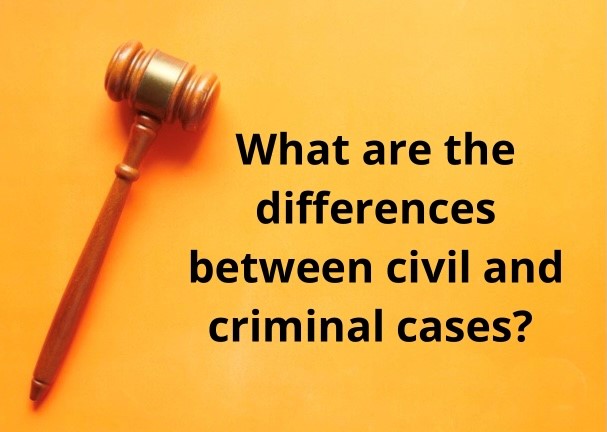
What are the differences between criminal and civil cases?
Our law distinguishes between criminal and civil cases and how these cases are processed in courts.
Criminal cases:
The State owes its citizens certain duties and protections. The State makes different laws which identify offences and prescribe punishment by the State in the forms of fines or imprisonment. In criminal cases the State is therefore always a party to criminal proceedings. Criminal proceedings therefore always involve at least 2 parties, namely the State and at least one accused.
Criminal cases are processed in court in terms of the Criminal Procedure Act 51 of 1977. The State is responsible to initiate prosecution and institute criminal court proceedings against the accused. The State carries the burden of proving guilt of the accused.
To win a criminal case, the State must prove its case beyond a reasonable doubt.
Section 35 of our Constitution protects the rights of arrested, detained and accused persons.
The aim of a criminal case is to punish the accused. The outcome of a criminal case is whether the accused is found guilty or not guilty of a crime.
Civil cases:
Civil court cases arise because of disputes between parties which cannot resolve the dispute by themselves, or through processes of mediation or arbitration. Section 34 of our Constitution provides for the right to access to courts for a fair public hearing to resolve disputes. Civil court proceedings are primarily governed by the Superior Courts Act 10 of 2013 and the Magistrate’s Courts Acts 32 of 1944.
Civil procedures can be used for the following purposes when a person is of the view that another person violated his/her/its legal right:
- To obtain a declaratory order.
- To obtain an interdict to prevent damage or injury.
- To recover compensation for damages or harm suffered.
- To claim specific performance.
Considering the above, there could be only one party to civil proceedings. When a legal issue does not require the response of another party, a single party could approach the court on behalf of itself. These cases are cited as “Ex parte” cases.
The burden of proof in a civil case is on the party who makes allegations. To succeed in a civil case, a party instituting the case, must prove his/her/its case on a balance of probabilities.
The outcome of a civil case is whether the court allows or dismisses the requests of the person who instituted the civil case.
Sometimes the same legal matter can be both, criminal and civil. Such criminal and civil proceedings relating to the same facts can be processed in different courts at the same time.
Our top lawyers are ready to assist with criminal or civil cases. To obtain information about your options and cost estimates, connect fast on this link: https://lawyersworkingfromhome.co.za/connect-with-a-lawyer/